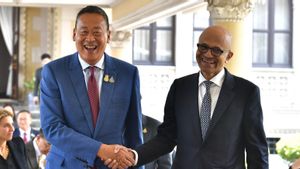
JAKARTA - Alphabet Inc's Google says it has seen high-profile Russian hackers, such as FancyBear, engage in espionage, phishing campaigns and other attacks targeting Ukraine and its European allies in recent weeks.
The Google Threat Analysis Group, which focuses on computer hacking and intrusion, has issued a warning to users about their actions. The group said in a blog post on Monday, March 7 that over the past two weeks Russian hacking unit FancyBear, also known as APT28, had been sending phishing emails to Ukrainian media company UkrNet.
Phishing messages aim to steal account login information from users, so that hackers can penetrate target computers and online accounts. Google did not say whether any of the attacks were successful. But the Russian side denies it has used hackers to pursue its adversaries.
Ghostwriter/UNC1151, which Google describes as a Belarusian threat actor, has also tried to steal account credentials through phishing attempts at Polish and Ukrainian government and military organizations.
Ukrainian cybersecurity officials said in late February that hackers from neighboring Belarus had targeted the personal email addresses of Ukrainian military personnel "and associated individuals."
Google also said Mustang Panda, or Temp.Hex, which the company describes as being based in China, had also sent virus-laden attachments to "European entities" with file names such as "The situation on the EU border with Ukraine.zip."
Google described the effort as a departure from Mustang Panda's standard focus on their long-standing target of originating in Southeast Asia.
Russian and Ukrainian hackers have also traded online attacks, such as damaging government websites, since Russia invaded Ukraine last month. Ukraine has publicly asked its hacking community to help protect infrastructure and carry out cyber-espionage missions against Russian troops.
Russia's attack on Ukraine was the biggest attack on a European country since the end of the Second World War.
Russia has called its actions in Ukraine a "special operation" that it says was designed not to occupy territory but to destroy the military capabilities of its southern neighbor and capture what it considers dangerous nationalist figures.
The English, Chinese, Japanese, Arabic, and French versions are automatically generated by the AI. So there may still be inaccuracies in translating, please always see Indonesian as our main language. (system supported by DigitalSiber.id)






